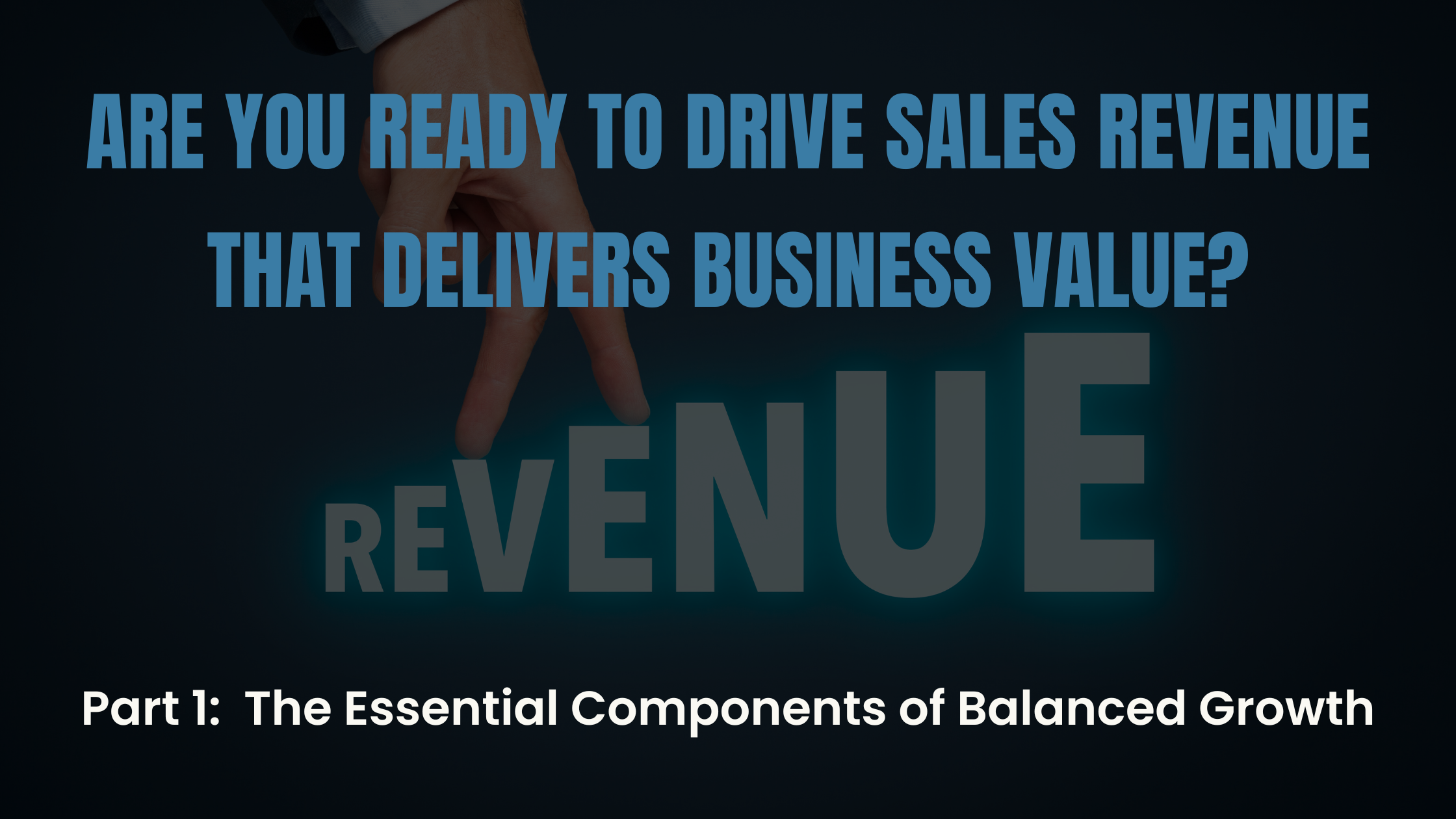Quick search
CTRL+K
Quick search
CTRL+K


Since 2010, the Global Law Experts annual awards have been celebrating excellence, innovation and performance across the legal communities from around the world.
posted 2 months ago

Two-thirds of CEOs state that their number one corporate objective is to grow the company. For many, growth is defined by increasing Sales Revenue.
But how many times have you witnessed companies on a tear that experience unintended issues which end up being terminal for the same CEO who mandated the growth?
By stepping on the accelerator and increasing sales, the company may have inadvertently created an even bigger problem than anemic growth.
Some examples of unintended consequences that impact other value drivers in the company and potentially destroy value include:

This is the first of a 3-part series that examines the recipe for success that delivers increased value associated with certain types of Sales Revenue growth – …the golden nugget that you have been looking for – Value acceleration.
In this first part, we’ll examine the essential components of the economic engine necessary for the achievement of a successful revenue growth strategy that delivers value. By successful we mean that the revenue achieved needs to be predictable and sustainable. In the next two parts of the series, we will be discussing the “What” and then the “How” (stay tuned – they are the important bits).
The first question that my Sales Xceleration expert partner always asks when we talk about growing a company is “What is the $ Goal we want to achieve?”. This is the right question. We want to grow – but you need to answer the question: by how much and how quickly? In other words, he is asking the question “What is the Plan?”.
The plan goals should be both Strategic (3-5 years out) and Tactical over the shorter term (typically one year). Strategic goals are necessary because building out a sales team with tools, systems and processes that are scalable are long-term activities that require investment capital. Tactical goals targeting a certain level of sales once the infrastructure is in place with the appropriate skills, require a further level of detail to prove that the revenue levels contemplated provide a satisfactory return on investment.
IMPORTANCE OF A BUSINESS PLAN
A written business plan is a statement of intent and clarification of purpose for everyone involved. It is a clarification of priorities. At its simplest, it is a communication tool and the golden key to fostering buy-in and alignment. For the team involved in implementing the plan, it is also a motivational tool as they can begin to envisage their role in executing the plan.
A planning process allows for kinks in the thinking to be ironed out minimizing the bumps in the road and therefore allowing for acceleration to occur. It provides a methodology for ideas and assumptions to be proved. It is a GPS that gives you a road map to reduce the odds of getting lost along the way. In other words, it is a risk-reducing exercise.
Fundamentally, it allows targets and goals to be set that can be benchmarked for reasonableness, and ceiling tested against company capacity and achievability. Crucially, it provides analytical support to aid critical decision-making and reduce guesswork.
Put in the context of the question: “What is the sales goal you want me to plan for?” it provides a process to answer the question: “At a particular level of sales and velocity, does the organization’s operations have the capacity, process, and competency to deliver on the promises made by the sales department”.
WHAT DISCIPLINES ARE A PREREQUISITE TO RELIABLY DELIVER SALES REVENUE GROWTH?
Growth that is valuable needs to be sustainable, predictable, and transferable into the hands of a third party. It also follows that as value increases so does the ability to deliver higher levels of profitability and cashflows. The disciplines that are required as a foundation to deliver such results are:

Senior Management provides leadership and planning to decide on goals; clarify priorities and make decisions on the allocation of resources. Management provides the conditions under which alignment and motivation can be fostered toward the achievement of goals.
Human Resources create and develop the skills and knowledge base needed for the company to execute its goals.
Recurring revenues allow the company to sustain its operations, providing the predictability for the company to pay its bills as they fall due and to invest for future growth. Recurring revenues have a higher value than one-off gains for these reasons.
Margin is the ability of the company to make an economic return on its activities. The higher the margin relative to the industry average the more valuable the company is compared to its competitors.
Financial and operational reports allow the company to monitor its progress and benchmark itself against its competitors. Timely reporting provides the key metrics that can facilitate corrective action and capture opportunities as they arise.
Sales plan and process are critical elements to organizing resources around an action plan, scaling resources around a process that is replicable with the ability to delegate, monitor, incentivize and organize.
Operations is the body of resources, tools and processes that are required to deliver on the promises made by the Sales team in a timely manner.
Customer satisfaction is the mindset of the customer after receipt of the product or service which was promised by the company. A high level of customer satisfaction is correlated with increased company value.
In short, a valuable company creates a plan to capture the economic returns from market participation and delivers returns from its activities that are higher than its competition while providing products or services that are in demand at service levels that deliver above customer expectations.
SALES REVENUE GROWTH
Valuable sales revenue growth therefore has a business underpinning that spans each of the above disciplines. Management is responsible for deciding on the sales targets that they want to be achieved to earn a targeted rate of return, and they are responsible for putting in place the resources that are capable of delivering on each of the above business needs. Specific examples of these are:
EARNING THE RIGHT TO GROW
It is important in business to understand that there are various rights of passage. Sustainability and predictability are two of those rights. Sales Revenue growth fuels the prospects of a company to be valuable, but only if the prerequisites detailed above are in place and organized such that predictable profits and cash flows, at levels at least commensurate with the competition, are being earned while satisfying the customer base. In the absence of a balanced economic engine, unintended consequences occur that are costly and time-consuming to resolve.
The right of passage that allows a company to achieve valuable growth can be witnessed most clearly by growth that perpetuates when the value drivers that we have identified are balanced, working in harmony and appropriate for the size of the company in question.
This balance is what makes the difference between a successful entrepreneur and an underperforming or failing one. It is the X-factor… Different stakeholders know it when they see it; they want to be part of it when it is working and stay away from it (or leave) when it is not.
Finally, right of passage requires sustainability and predictability. In its absence, investors turn away from companies that cannot deliver on what they have promised or, at least, charge significantly higher premiums for the uncertainty. “Under promise and over deliver” is a way to successfully manage the “right of passage” that the business community demands.
SUMMARY
In order to deliver valuable growth from Sales Revenue acceleration, it is essential to organize resources in a manner that enables the fulfillment of commitments made by the sales department. Not having the resources properly organized will lead to unintended consequences which will increase the cost of investment and extend the timeline to success, or worse cause the company to stall or fail.
Having your valuable resources in place will give the organization’s economic engine the horsepower to gear up and respond smoothly when the growth accelerator is pressed by the leadership group. We have outlined for you, above, the essential requirements of balanced growth.
In Parts 2 and 3 of this series, we will outline for you the build-out of the 4 key sales competencies that will enable you to accelerate your sales revenue growth, assuming that your economic engine is in place. We will then detail how those competencies operate in practice for “best in class” companies to deliver on your growth imperative and to sustainably achieve your right of passage to the “next level” of business value.
Author


There are no results matching your search.
Resetposted 2 hours ago
posted 14 hours ago
posted 14 hours ago
posted 3 days ago
posted 4 days ago
posted 4 days ago
posted 4 days ago
posted 4 days ago
posted 4 days ago
posted 7 days ago
There are no results matching your search.
ResetFind the right Legal Expert for your business
Sign up for the latest legal briefings and news within Global Law Experts’ community, as well as a whole host of features, editorial and conference updates direct to your email inbox.
Naturally you can unsubscribe at any time.
Global Law Experts is dedicated to providing exceptional legal services to clients around the world. With a vast network of highly skilled and experienced lawyers, we are committed to delivering innovative and tailored solutions to meet the diverse needs of our clients in various jurisdictions.